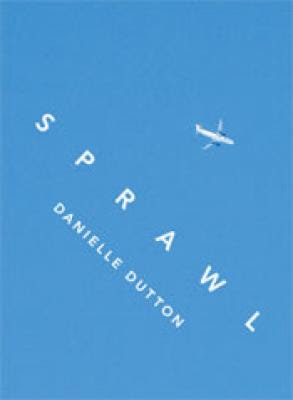
by by Margaret Kolb

Published by Siglio, 2010 | 143 pages
In an interview with her publisher, Danielle Dutton talks about the origins of her most recent novel: “In the wake of 9/11, I, like everyone else, was thinking a lot about America, about what we are, inasmuch as we are something. We spread out. We seek edges [...] I was thinking about the suburbs, about sprawl.” Dutton’s S P R A W L is the result of this exploration. Unfolding over the course of its single, sprawling 140-page paragraph, S P R A W L satirizes the strained marriages, backyard pools and countertop crumbs of American suburban life. Yet, in lieu of an easy, acerbic disdain, Dutton opts for a sly lampooning, one that even gives a hint of something resembling mild affection. For all its facetious discourse on the monotonies of floral arrangements, cupcakes, and other suburban detritus, S P R A W L criticizes without ever condemning. It is in this that its charm and power lies.
Dutton came to writing by way of art, and her first emphasis in S P R A W L is not content but form. This is most obviously demonstrated by the book’s 140-page single paragraph layout. But it’s not only chapter breaks and indents that are absent: the book also shuns a linear plot. Instead, the unnamed narrator tells her story by way of reveries that amble together like adjacent cul-de-sacs. Here, as in suburbia itself, little happens on the surface: the narrator goes inside, goes outside, takes a bath, arranges fruit candles. Within these reveries, however, a rich internal life unfolds, albeit one filled with thoughts of consumerism, eroticism, bulldozers and the kitchen sink.
Lacking a central conflict, S P R A W L is buoyed instead by its satiric tone, most pronounced in the narrator’s comic timing, her narration a monologic succession of one-liners, buttressed by unexpected juxtapositions and droll observations. She is of suburbia, but also apart from it, at once enraptured in and critical of her surroundings and herself: “I am a rugged individualist and a sage. Thank you for attending my Tupperware parties.” She is open, self-deprecating, and jocular, but also evasive. Her continual joking suggests another, deeper motive, though Dutton never gives more than partial hints about what it might be.
Within the conventions of suburban fiction, it comes as no surprise that the narrator is married, or that her marriage is falling apart. Occasionally she fights with her husband, or has sex with him, or eats dinner with him in the backyard, but mostly they avoid one another. All the while she comments on this with the same clinical distance she uses in her analysis of suburbia’s local politics and landscaping. “We move from room to room, sometimes for a whole day, without conversation. We arrange objects in patterns on tables and come along to disrupt patterns of papers, utensils, cupcakes, plates.” They circle, rearrange, and disrupt, but rarely converse.
In the context of S P R A W L’s larger themes, this makes sense: clinical distance is perhaps the core dynamic in this world. Dutton has said that the book was inspired by Laura Letinsky’s series of domestic still lifes, Hardly More than Ever. Letinsky’s photos seem to have helped Dutton access the explosive stillness of the suburbs that she wanted to evoke. In S P R A W L, the influence of Letinsky and photography are most manifest in the narrator herself: she exists in a state of perpetual pose. In one scene, the narrator goes to the city to see a series of Dutch paintings. Spurred by the works’ timelessness, she imagines her own arrangements, interpreted and filled with meaning by a future scholar of the visual arts: “One day someone will decode intricately wrapped gifts on the far limits of the tabletop: glass grapes, bunches of plastic marigolds, a blue plate, a white plate, a heaping pile of fallen petals.” The greater narrative structure of the book is also highly visual, pervaded by the awareness of the human or camera gaze, of claustrophobic voyeurism and paranoia, the self-consciousness and meta-awareness of suburbia itself.
If not lived firsthand, the suburbs are still an inescapable, overgrown subdivision of the public consciousness manufactured in television and advertising. Hemingway once described his own suburban hometown, Oak Park, Chicago, as a place of “wide lawns and thin minds.” Dutton seconds this statement, but sees beyond it as well. The American suburb exists, with its sprinkler systems, its minivans, and its central air, in a place of marked privilege. So much about this existence begs critique, and yet we simultaneously wish some similar form of comfort for the underprivileged. Dutton is not the first writer to explore the paradoxical nature of contemporary suburbia; Updike, Cheever, and Roth, among others, have already investigated this terrain. Yet Dutton has found her own perspective on the subject, and a formal balance between experiment and simplicity, critique and appreciation. Yes, S P R A W L heaps volumes of satire on suburbia. Here, however, suburbia is in on the joke, and returns our gaze.
Erin Becker is an English teacher in Santiago, Chile, a graduate of the English and Creative Writing program at the University of North Carolina at Chapel Hill, and a native of Cedar Rapids, Iowa. Her interests include the relationship between propaganda and literature, writers during wartime, and contemporary media discourse.















click to see who
MAKE Magazine Publisher MAKE Literary Productions Managing Editor Chamandeep Bains Assistant Managing Editor and Web Editor Kenneth Guay Fiction Editor Kamilah Foreman Nonfiction Editor Jessica Anne Poetry Editor Joel Craig Intercambio Poetry Editor Daniel Borzutzky Intercambio Prose Editor Brenda Lozano Latin American Art Portfolio Editor Alejandro Almanza Pereda Reviews Editor Mark Molloy Portfolio Art Editor Sarah Kramer Creative Director Joshua Hauth, Hauthwares Webmaster Johnathan Crawford Proofreader/Copy Editor Sarah Kramer Associate Fiction Editors LC Fiore, Jim Kourlas, Kerstin Schaars Contributing Editors Kyle Beachy, Steffi Drewes, Katie Geha, Kathleen Rooney Social Media Coordinator Jennifer De Poorter
MAKE Literary Productions, NFP Co-directors, Sarah Dodson and Joel Craig